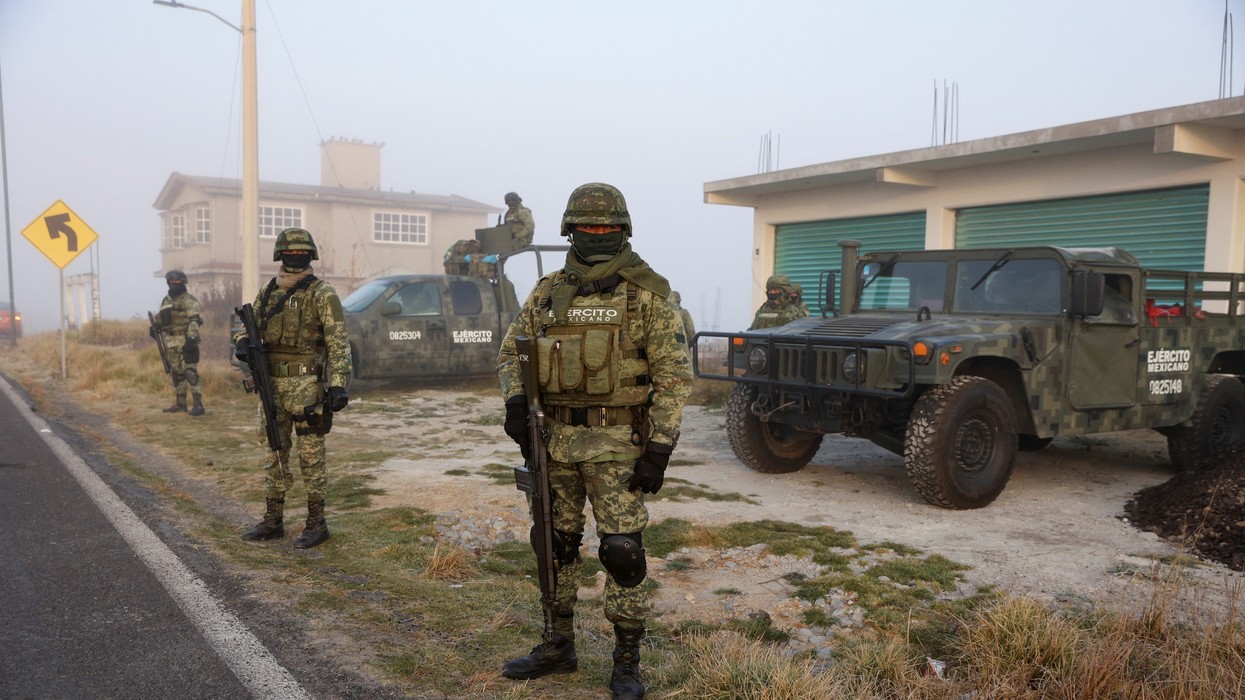On Wednesday, President Joe Biden announced that he would stop sending offensive weapons to Israel “‘if they go into Rafah.” It is the most notable sign of his administration’s shift in its support for Israel’s war to date, but questions remain over how and when the president will follow through on his words.
Meanwhile, the administration paused a recent shipment of bombs to Israel, but it is not a permanent decision, and the president's claim that “they haven’t gone in Rafah yet” — despite the fact that Israel is continually striking the southern Gazan city, have tanks positioned on the periphery, and took control of the the Rafah crossing — suggests that U.S. support may otherwise continue so long as the campaign remains relatively limited.
Behind the scenes in the U.S. government, there has been a bit of turmoil.
At least four federal employees, including three from the State Department, have publicly resigned, explicitly in protest of the administration’s response to the war. This comes amid a number of stories about internal tension in the Biden administration concerning its largely unwavering rhetorical and material support for Benjamin Netanyahu’s government as it prosecutes a war that has now killed nearly 35,000 Palestinians.
In addition, hundreds of civil servants from various government agencies have signed a series of open letters calling on Biden to push for a ceasefire in Gaza and de-escalation in the wider region.
Unfortunately, one federal employee with more than 15 years of service in two government agencies told RS, “the internal messaging to staff mirrors the external messages. And that has been a source of both disappointment and deep frustration.” (Sources asked for anonymity in order to discuss internal dynamics.)
In other words, the informal 'dissent channel' doesn’t seem to be moving the needle, seven months into the war.
Critics within the administration are not motivated by their moral qualms alone. There is a growing sense among staff, according to another source, that the long-term alliance with Israel does not serve U.S. interests. Specifically, they are worried that Washington is itself being drawn into a regional war, that its actions are increasing instability in the region, and that “ironclad” support for Israel’s conduct in Gaza is undermining any claim that the U.S. is a champion for global human rights and democracy.
The dissent also extends beyond the departments that are typically considered responsible for implementing Gaza policy, such as the State Department or USAID. It includes officials in other agencies whose work is tangentially related to the war and still others who are simply outraged by American complicity in the rising death toll and humanitarian crisis.
“Having worked in the administration during the Afghan withdrawal and also the Russian invasion of Ukraine, so many efforts were spearheaded and led, and normal procedures were bypassed given the urgent humanitarian situation. Here, however, it has been a totally different ballgame. There are systemic issues with how we issue Palestinian cases,” says a homeland security official. “Any kind of initiative to expedite help for Palestinians has been blocked or quelled or slowed down dramatically in a way that I’ve never seen before.”
The signs were there in the early days of the war, sources say. “The decision was made from the top very early on,” says an official with 25 years of national security experience. “Experts have been shut out from the decision-making process, making it very hard to change that policy.”
Annelle Sheline, a former staffer in the State Department’s Bureau of Democracy, Human Rights, and Labor, who resigned in protest of the administration’s Gaza policy in March, says her experience was similar.
“There are so many people who know the region really well working at State, who were raising concerns from all kinds of angles: the U.S. national interest angle, the legalistic angle or the human rights angle,” Sheline tells RS. “People who spent their whole careers working on these things, and nobody was being listened to. Even relatively senior officials inside State who are very concerned and very opposed were not being listened to.” (Sheline was previously a research fellow at the Quincy Institute, which publishes RS.)
Federal employees who are disillusioned with the approach to Gaza say they have explored multiple avenues to make their position clear.
One federal employee told RS that when staffers raised concerns about unconditionally supporting Israel in the early stages of the war, they realized that doing so through formal channels was ineffective.
“As the months dragged on, it became evident that the dissent channels that the State Department likes to tout are about placating staff more than actually listening to those with deep regional and policy expertise and making changes,” says the 15-year federal employee.
The dissidents say only a handful of individuals in the upper echelons of the State Department, at the National Security Council and, and ultimately Biden himself, have decision-making power, and no amount of dissent has made a difference.
According to one report, Biden’s own staunch pro-Israel position has been solidified over five decades in Washington, and his commitment to the Jewish state is not easily shaken.
In the months since October 7, a number of staffers have resorted to quieter and more informal forms of protest — having unsanctioned conversations with journalists; changing social media avatars to express solidarity with Palestinians; or wearing keffiyehs during work meetings — to express their unhappiness or distress within the administration.
When RS spoke to these federal employees, they noted the importance of May 8, the day the Biden administration was supposed to produce a report for Congress on Israel’s compliance with international humanitarian law. It would have been a clear sign of how far Biden and other top officials are willing to go to back the war effort. That date came and went with no report on Wednesday. There are conflicting reports on whether the report is delayed “indefinitely” or whether it is expected to be delivered soon.
As the staffers noted, the Israeli blockade of aid — at the very least — has been so blatant that it would be hard to believe that any official acting in good faith would sign a report asserting the contrary. And this is an argument that many other notable individuals have made publicly.
“The determination regarding compliance with international law is one of fact and law. The facts and law should not be ignored to achieve a pre-determined policy outcome. Our credibility is on the line," Sen. Chris Van Hollen (D-Md.), the lawmaker who led the effort to require a report be submitted to Congress, recently said.
In late April, more than 90 lawyers signed a letter to the Biden administration calling on it to suspend military aid to Israel. “The law is clear and aligned with the majority of Americans who believe the U.S. should cease arms shipments to Israel until it stops its military operation in Gaza,” read the letter. At least 20 of the signatories work in the administration, according to Politico.
Politico reported on Tuesday that there has been an uptick in the number of non-public resignations by officials and that more resignations, both public and non-public, will soon follow.
Sources tell RS that there have been discussions of larger-scale resignations, though ultimately it remains unclear whether such dramatic steps would make much difference, given how little impact the public dissent has made to date. Many staffers are reluctant to quit their jobs because of family or financial considerations.
Sheline, who was the third official to publicly resign over Gaza policy, says that there have been efforts to delegitimize her resignation, as well as those that preceded it. “I think if there were a lot more public resignations, I do think it would be very hard for the administration to pretend that it was just a one-off. So I do hope that there will be more.”
- Washington is strangling young foreign policy professionals ›
- How Biden's 'A-team' squandered its foreign policy opportunity ›















